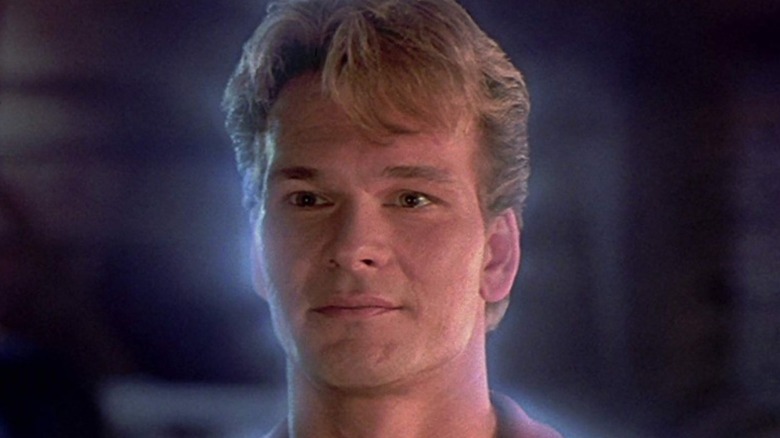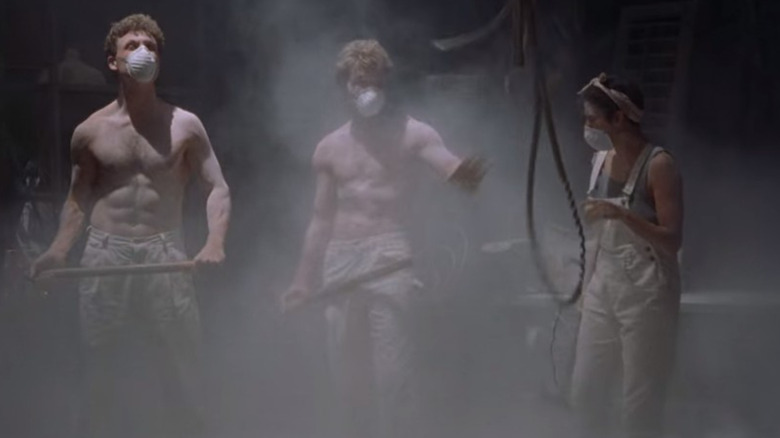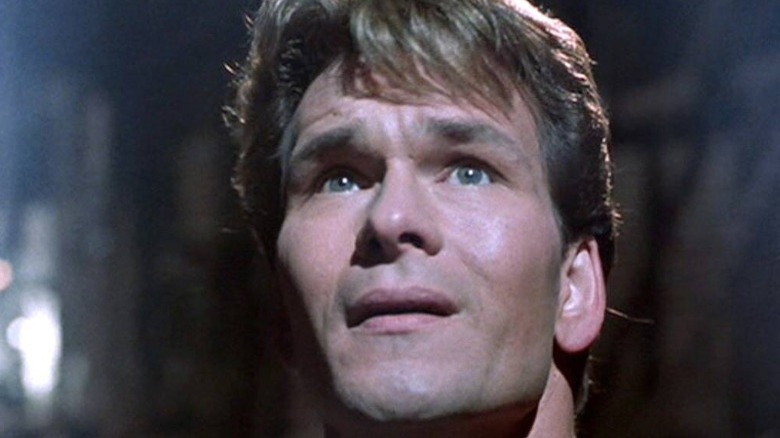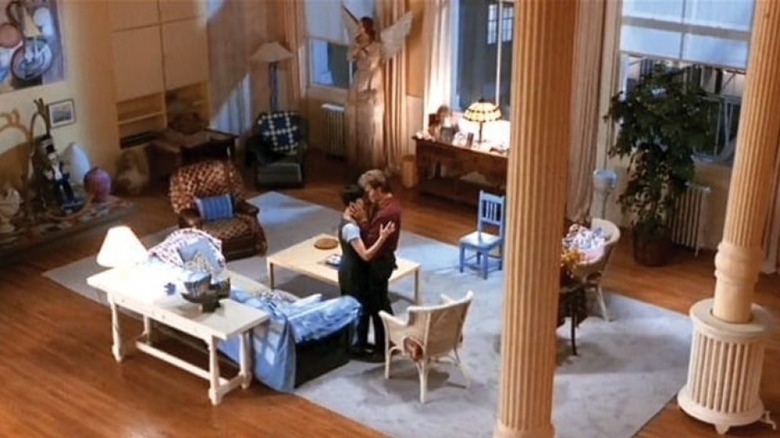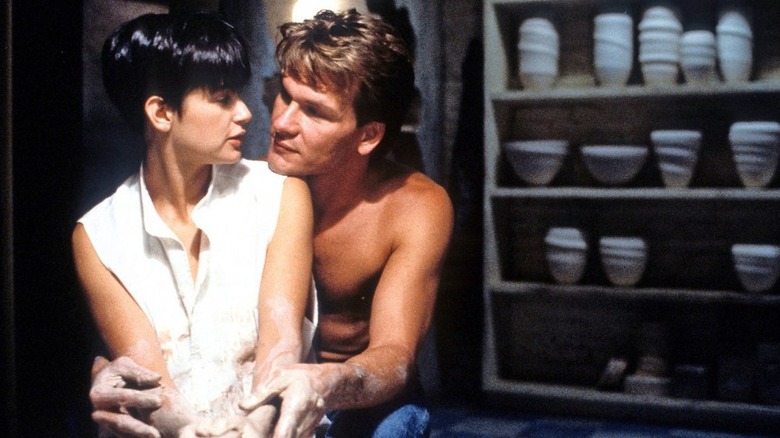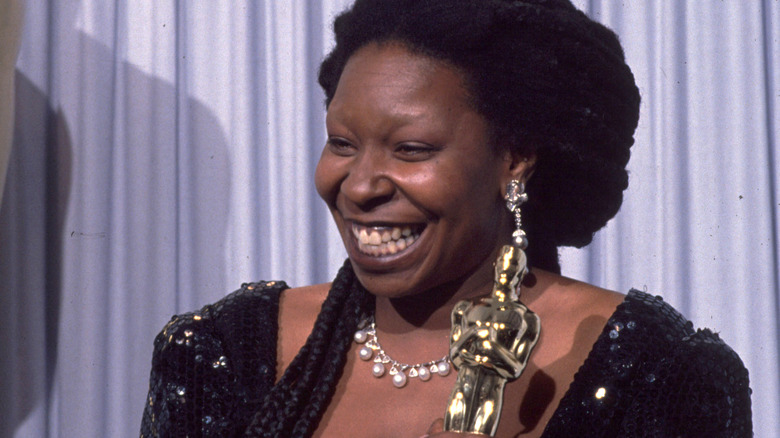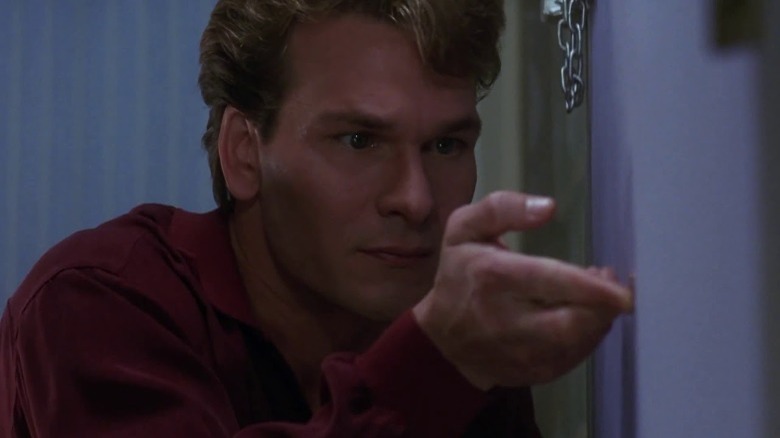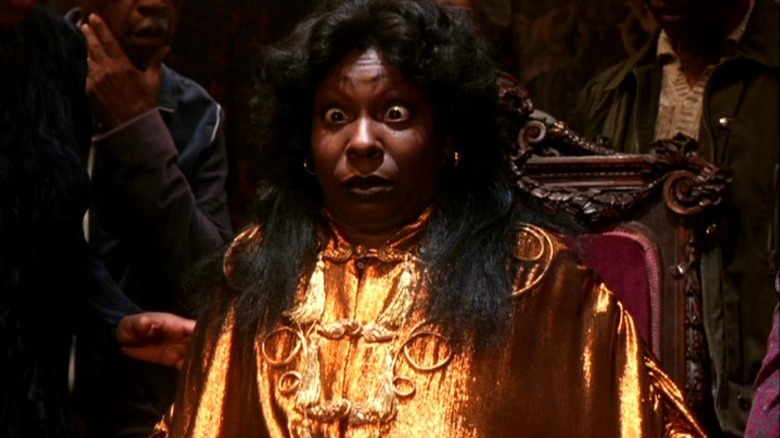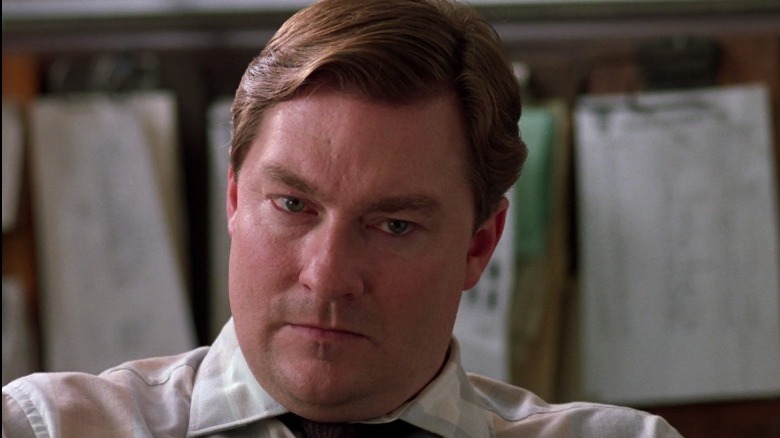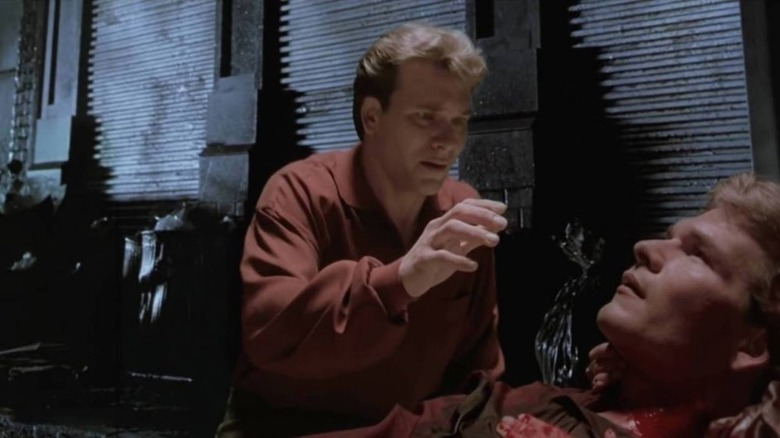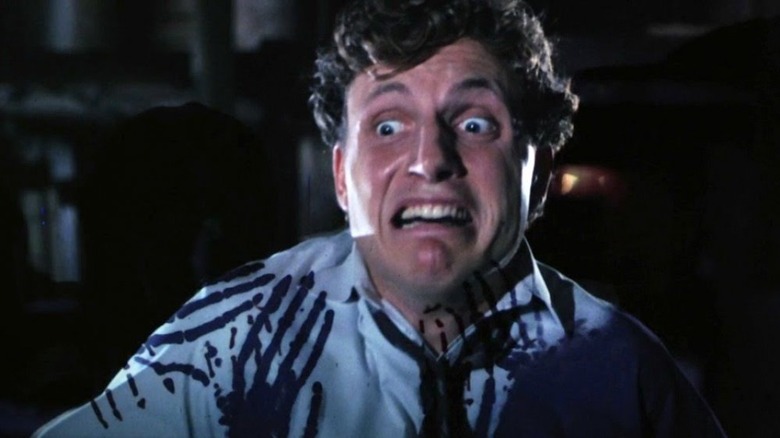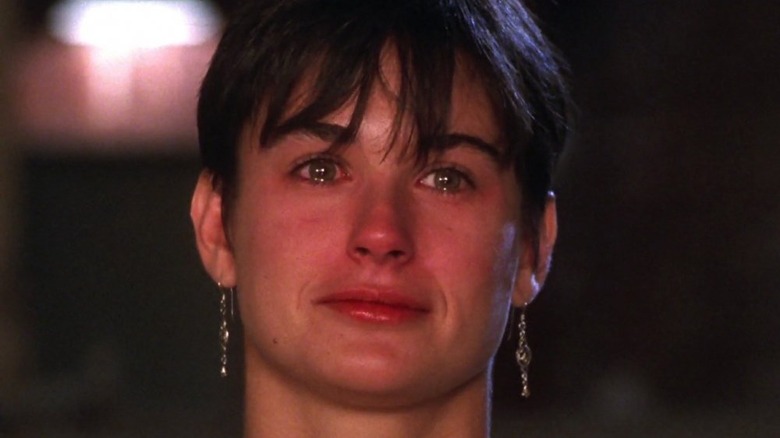Things You Only Notice In Ghost After Watching It More Than Once
More than 30 years after its release, "Ghost" is one of those classic movies that's referenced so often it might feel like you've seen it, even if you haven't. At the very least, the often-parodied pottery scene is something you remember well. Although it's most well known for that steamy scene and the picturesque, tragic love story of main couple Sam (Patrick Swayze) and Molly (Demi Moore), "Ghost" is actually a thriller. After Sam is killed by a thug hired by his best friend Carl (Tony Goldwyn), the ins and outs of becoming a ghost mostly serve the plot as Sam uncovers the truth and tries to save Molly's life from beyond this mortal coil.
In its straight-forwardness and blending of romantic and fantasy elements, it harkens back to classic Hollywood romances like "Heaven Can Wait," and the screenplay earned writer Bruce Joel Rubin a well-deserved Oscar. But its simplicity and one-note visualization in pop culture history belie a fascinating story, one that raises a lot of metaphysical questions in short order, full of characters it can be hard not to second guess. Here are the things you only notice in "Ghost" when you watch it more than once.
Who wears white clothes to do construction work?
At the very beginning of "Ghost," Sam, Molly, and best friend Carl are busy knocking down walls and fixtures in Sam and Molly's newly purchased loft ... wearing a rather confusing trio of coordinated outfits. If Sam is anything like Patrick Swayze's other film roles, then he and Carl likely bonded as friends over any excuse to go shirtless, so that makes a certain amount of sense. But where did they both get white jeans to match Molly's white overalls?
Moreover, why wear white if you'll be knocking down drywall and doing the generally dirty work of home renovation? Did they call Carl to let him know the dress code before he got there? "Hey Carl, just so you know, we're nouveau riche so we bought brand new painters' whites to do demolition in even though we're not painting yet ... No, no need for a shirt." "Ghost" may have come out in 1990, but it really captured the dying spirit of the 1980s, which in many ways was a generally shirtless time.
Sam is kind of a jerk in life
Granted, we don't get to know Sam for very long before he's shot and killed, but if you think about it on a rewatch, he's kind of boorish to Molly. The most famous scene of the movie, rife with sexual chemistry though it may be, is Sam completely ruining a piece that Molly was throwing on the pottery wheel. In an earlier scene, he thinks it's funny to pretend to dangle her out of the window of their loft. Fun!
Later in the film, when Sam is trying to convince psychic Oda Mae Brown (Whoopi Goldberg) to help him, he sings "I'm Henry the Eighth, I am" over and over at her until she relents — annoying, but reasonable under life-and-death circumstances. But when Molly hears about it, she reveals that's also how Sam got her to go out with him in the first place. And once they're in a committed relationship, he makes it a particular point to always say "ditto" instead of the more earnest and vulnerable "I love you too." Clearly Sam was just coasting through his (unfortunately short) life, content to rely on being as handsome as an in-his-prime Patrick Swayze to smooth the way for generally douche-y behavior.
How can Sam and Molly afford that loft?
No offense to Molly, but you have to assume that the income of a sculptor only goes so far in Manhattan real estate. And Sam may be a successful Wall Street investment banker, but he's clearly a new one that gets nervous before meeting with the proverbial Japanese investors, and an ethical one that's too naïve to realize what Carl's up to until it's too late. Granted, the '80s were an ethical haze of opulence, trickle-down economics, and cocaine, but re-watching "Ghost" after recognizing other suspiciously large NYC apartments in film and television, it's impossible not to un-suspend your disbelief.
It's not just a question of whether Sam and Molly can afford it, they renovate the entire thing from basically scratch after knocking all the fixtures and walls out at the beginning of "Ghost." Does one or both of them come from money? Are those absurd giant Roman columns they put in load-bearing? Even after Sam's death, other than going into the bank to sign some papers (life insurance?), Molly's financial situation is unaddressed moving forward. One presumes she had to move out of that cavernous, preposterous loft well before it was listed for $10.5 million in 2015.
The famous pottery scene has a jarring continuity error
Even the one scene in "Ghost" that everyone remembers the best has a surprising, borderline-inexcusable continuity error in it. In by far the most famous pottery-related scene in all of cinema, Sam sits behind Molly late one night while The Righteous Brothers cover of "Unchained Melody" plays on their bespoke, vintage jukebox. The chemistry practically sparks through the air as they intertwine fingers, lean against one another, and get potter's clay all over themselves.
But as soon as they get swept away by passion and move away from the wheel, all of the clay is magically gone. Not even a smudge remains visible on their arms and hands. It's an ode to the undeniable chemistry of the stars that this isn't something you catch on the first watch, but it's a strange mistake that you can't un-see once you catch it on another viewing. It's jarring enough to wonder, in the moment, if it was intentional — maybe Moore and Swayze didn't mind getting clay on their arms, but drew the line at getting it everywhere else on their persons.
Ghost wouldn't work without Whoopi Goldberg
Somehow all of the most frequent elements of "Ghost" in our collective memory are about the two romantic leads — the pottery scene, "ditto." But when you watch it again, the clear MVP of the film is Whoopi Goldberg with her inimitable portrayal of psychic Oda Mae Brown. Patrick Swayze and Demi Moore both do excellent jobs, but they're largely crying on command or just looking strained and anxious about things. Tony Goldwyn hits a few more notes as the shifty, sniveling Carl — he played the bad guy so well he once got terrible service in a NYC restaurant as a result.
But Goldberg, more than the rest of the cast, has to anchor the film with a performance that's tender-hearted, funny, impetuous, and undeniably her own. She convincingly plays trepidation and fear when she starts to hear the dead, tenderness when she consoles a heartbroken Molly at several points, and slapstick anxiety when Sam has her pull a con on the bank and steal the laundered drug money. Every few years, a comedic performance like Goldberg's will get a token Oscar nomination, but Whoopi actually won the Oscar part of her career EGOT for her role. All due respect to Swayze, Moore, and Goldwyn, but it would be a lot easier to imagine other actors taking those roles and doing just as well; it's nearly impossible to picture someone else as Oda Mae.
The movie raises more questions about ghost-physics than it answers
According to Film School Rejects, "Ghost" screenwriter Bruce Joel Rubin mentioned on a commentary track for the film that people would often ask him why Sam can walk up stairs and take elevators when he passes through walls. His explanation?: "Your mind creates the world." And while that's a pithy response that summons up many interesting thoughts about the nature of perception, the soul, and the self, it doesn't really answer anything. Your mind creates the world, but only for the soles of your feet? If the mind (and whatever remains of the mind in "ghost" form) possesses this passive ability to interact with the physical realm when gravity is concerned, why does Sam have to summon up all of his emotions to kick a bottle cap or lift a penny?
Generally, "Ghost" seems content to reveal new rules of ghost-ness every now and then, mostly for certain moments in the plot to come together. We learn midway through that ghosts can briefly "possess" Oda Mae, when a presumptuous ghost named Orlando wants to talk to his wife. But other than the fact that it weakens the ghost that does it, there's not much detail. Can only psychics with "the gift" be possessed? It leads to a touching scene, of course, when Sam possesses Oda Mae (with permission) and embraces Molly for a final time. But these questions make you wish for a sequel where Oda Mae and her numerous new ghost clients explore exactly what the rules of this universe are.
Why does Oda Mae initially want nothing to do with Sam?
Look, no one is saying it wouldn't be unsettling to start hearing ghosts. Most people would and should be downright terrified. But Sam happens upon the shop of Oda Mae Brown, who specifically has been pretending to commune with the dead for her entire life. Shouldn't she have some questions? Yet Oda Mae spends the first few scenes with Sam (who proceeds to hector her) imploring him to go away, and begs off of visiting Molly when she's gotten the basic message across. Eventually she comes around to helping Sam again, although a lot of that might have to do with her own life now being in danger.
Upon a re-watch, it's clear that her reluctance is sort of necessary to keep the movie from being over too soon. She tells Molly just enough details that only Sam could know how to get in the apartment, and then leaves before she's there long enough to really relay enough messages that Molly's sure of what's happening. Her criminal background and reluctance to get involved help Molly doubt the truth until the last act of the film. In retrospect, it's hard not to wonder why her professional and entrepreneurial sides don't give her more natural curiosity about hearing an actual ghost. Luckily for Oda Mae, apparently word gets around quickly in the New York City ghost scene, as she's inundated with spirits not long after Sam shows up.
Molly should have just not mentioned ghosts to the police
When you re-examine the plot of "Ghost" more than once, it's easy to imagine yourself in each character's situation and think about what you'd do differently. And while it doesn't feel great to second-guess the decisions of Molly in the midst of deep grief, it really seems like she should have known the police wouldn't be convinced that life exists after death in one sitting. A very skeptical police sergeant (played by a young Stephen Root!) patiently shows her Oda Mae's long criminal history, and then dismisses the information out of hand. We the audience watch helplessly as the police ignore being told the killer's name and address.
But given the gravity of, you know, the sudden and confirmed existence of the afterlife, it's not the most surprising result. If Molly believed that it was real information, maybe it would have been better to send an anonymous tip? Or, as a witness to the crime, she could have claimed to spot Willie Lopez on the crowded streets of New York City and merely followed him to his address.
How do ghosts' clothes work?
Here is a minor but persistent quirk of ghosts in "Ghost" that becomes a nagging question on re-watching: What's up with ghost clothes? As a rule, it seems, you're stuck in the outfit that you died in for your entire ghost-hood. Sam sports the '80s-puffy, maroon dress shirt he wore to that fateful performance of "Macbeth" for the rest of the film. But technically, in the very last moments of his life, that shirt would have sported a distinctive bullet hole, which fails to make the jump to the afterlife.
The same goes, eventually, for any scrapes and scuffs Willie Lopez gets when he gets hit by multiple cars, and the white dress shirt that Carl totally ruins by getting impaled on a giant shard of glass. One has to wonder what that means for piercings or tattoos? Ghosts may have to linger and deal with their unfinished business, but at least in "Ghost" they never have to go to the dry cleaner.
The Hell demons are hilariously low-fi
Despite its subject matter, "Ghost" has hardly any elements of horror — it's largely a thriller with supernatural elements. But when the bad guys, first hired hitman Willie Lopez and then back-stabbing friend Carl Bruner, both die during the movie, we're treated to a sequence where dark, howling demon creatures drag both of their spirits into the shadows, presumably to the "Ghost" version of Hell. Unfortunately these demons are unintentionally the funniest part of "Ghost" by a mile when you watch them closely.
When they come for Willie, the scene is dimly lit and somewhat spooky, despite the "ooooohs" from the demons sounding like a collage of outtakes from "Scooby-Doo." But when Carl's dragged away at the end of the film, their hands have a visibly hand-drawn look to them, which, when combined with the cartoonish voices, produces a distinctly silly effect. It's almost as if they forgot to animate these sequences, had no CGI budget, and got some elementary school kids to do it frame-by-frame at the last minute.
What will Molly and Oda Mae say to the police?
"Ghost" ends as happily as it can, with the bad guys dead, and Molly and Sam given one last chance to say goodbye. But after the iconic line about taking the love with you and the deep, meaningful looks, there are still a lot of questions to be answered. Specifically, the police are on their way to find Molly, Oda Mae, and the dead body of Carl, who's managed to "Final Destination" himself and get impaled on a huge fallen piece of broken window. Based on Molly coming into the see the police earlier (when they also pulled Oda Mae's file), it might be hard to answer their questions.
And if the police don't end up charging them with manslaughter, they might be in danger from the drug dealers that Sam essentially stole $4 million from. They'd likely suspect Carl of stealing it, and then probably have questions for Molly regarding his death in her apartment. Or if they have another person inside the bank, they might be able to trace Oda Mae to withdrawing their funds under a false name. At the end of "Ghost," Sam moves on as the unfinished business of making sure Molly is safe has been achieved, but upon reflection, there's a lot more loose ends than you'd think he'd be comfortable with.
